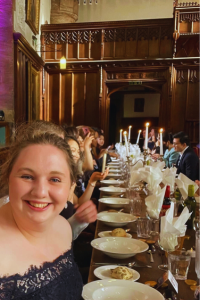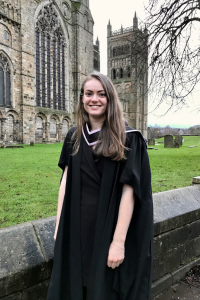Postgrad files - MA English Literary Studies
 Date: June 2023
Date: June 2023.png)
Meet alumni Laura Sadler and Lisa Benson, who have graduated from their Masters in English Literary Studies. They talk about their experiences of studying a postgraduate degree, what their plans are next and what advice they has for those thinking about an MA at Durham.
.png)
Laura Sadler
 What subjects did you study prior to arriving at Durham?
What subjects did you study prior to arriving at Durham?
Before I came to Durham, I’d studied a Joint Honours degree in English and French at the University of Liverpool. This was a four-year course during which I spent a year abroad in Brittany, France. During my Undergraduate studies, I became especially interested in eighteenth-century literature, women’s literature, Renaissance theatre, and adaptation.
What were the highlights of studying at Durham?
One of the highlights was being able to experience such a traditional and historic institution in a beautiful quaint city. One of my favourite activities was attending MCR formals – these were a series of formal dinners run for postgraduates and hosted at a different college each time. I tried to attend as many different MCR formals as I could during my time at Durham. These formals allowed me to meet and chat with postgraduate students from different colleges and disciplines that I didn’t encounter in my usual sphere. My one big highlight was probably attending the Castle MCR Charity Ball – how often do you get to go to a silent disco, watch a Queen tribute or drink beer in an 11th century castle? In general, I found the postgraduate community to be really friendly and welcoming. I found myself meeting a variety of people from different backgrounds, ages and ethnicities that you don’t find so much at undergraduate level – at postgraduate I was able to build up a really mixed friendship group and community, from people who were just out of their undergraduate degree, to those later on in life who had a host of professional and life experiences behind them. In terms of my course, I really enjoyed the small-group seminar format – these fostered some really good in-depth (and sometimes even heated) discussions and allowed a deeper dive into the literature than was available through more-distanced undergraduate lectures.
What are you doing now and how did your degree help you prepare you?
I am now undergoing a Collaborative Doctoral Award (PhD) through the Northern Bridge Doctoral Training Programme at Northumbria University in Newcastle. My research looks at the legacy of the eighteenth-century author Laurence Sterne in French fiction and is in collaboration with the Laurence Sterne Trust based at Sterne’s former home, Shandy Hall in Coxwold.
My postgraduate studies at Durham helped me explore and develop my interests in eighteenth-century literature and has given me excellent knowledge base to build upon for my PhD research. I learnt how to write at length through producing a 15,000 word dissertation, a very useful skill to have when going onto a PhD programme which is centred around the production of an 80,000 word thesis. I learnt a lot about my own ways of working during my Masters – for example, I work best by starting projects far in advance, allowing myself time off for relaxing or health reasons rather than writing to deadlines. I attended many of the skills sessions, strengthening my understanding of things such as digital skills, health and wellbeing, and time management. Finally, the career service and my academic advisors at Durham were pivotal in helping me finetune my PhD application and supporting me in the transition to PhD level study. I have established a great network of academic and postgraduate contacts as I move forward.
What advice would you have for prospective applicants to English at Durham?
Don’t feel like you need to lockdown onto one specific limited area or topic at this stage – there’s still plenty of room for exploration at Masters level, and I found it beneficial to explore modules from different time periods and genres – not only did this give me a better overall knowledge and understanding of English literature, but these supposedly different eras and topics cross over more often than you might think.
Consider doing your Masters degree part-time, particularly if you have financial, health or family considerations. I did mine part-time over two years, and it reduced stress and anxiety, gave me extra time to juggle my employment with my studies, allowed me more time to look after myself and to focus on my long-term health condition, and more time to consider my prospects for the future and prepare myself for the next steps in my career.
Finally, enjoy it! I did a Taught Masters degree (as opposed to a Research Masters degree) which was more like undergraduate. Whilst Masters level study is tough, but it may be the last time you do this sort of “taught” study (PhD research is very different, and much more independent). There’s a nice balance of independence and guidance at Masters level which allows you to explore your own interests, whilst remaining within supported frameworks. Use it as an opportunity to gain skills and explore in further depth what fascinates and excites you – then make sure to check out the Charity Ball in June!

Lisa Benson
 What were the highlights of studying at Durham?
What were the highlights of studying at Durham?
My highlights of studying at Durham were: the cosy English Department, with a friendly cohort of like-minded students; the scope of the MA English Literary Studies course, which allowed me to study a wide range of texts, from Renaissance Humanism to Post-War Drama; and, the beautiful city, witnessing it change through all four seasons. I met some of my best friends at matriculation, and during the year, I experienced university life from college balls to bartending at the Student Union. Moving to the North East, I got to discover a whole new area of the UK.
What are you doing now and how did your degree help prepare you?
I live in Paris and work as a communications and campaign manager at the British Embassy. I use languages every day, writing products like social media copy and email marketing newsletters. My degree gave me the confidence to apply for the job, the paperwork to start as an intern, and an understanding of literary techniques used for different audiences. I typically communicate to businesses, both British companies selling to France and French companies investing in the UK. I’ve also worked on exciting projects like the UK-France Summit and crisis communications to British nationals living in and travelling to France during the pandemic.
What advice do you have for prospective applicants to an English MA at Durham?
My one piece of advice for prospective applicants to the English MA at Durham is to go for it. Only you can open that door for yourself. If you decide to accept the opportunity, make sure to use the year to its full potential. It doesn’t take long to discover the small city, but you can fill your time even in the summer by getting involved in whatever interests you: talks, walks, travel, work. Make it work for you, and leave with no regrets.


/prod01/prodbucket01/media/durham-university/alumni-/the-hub/The-Hub-Banner.png)